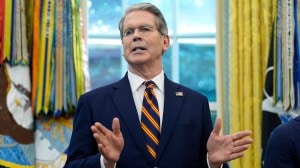Rice rebuts critics on the Hill, point by point
Slicing through layers of informed American scepticism, US Secretary of State Condoleezza Rice has made the strongest pitch so far...

Slicing through layers of informed American scepticism, US Secretary of State Condoleezza Rice has made the strongest pitch so far on why the nuclear deal with India needed to be signed by Washington in Washington.
Rice stood her ground against persistent demands from opponents of the deal in the US Congress to impose new conditions such as limiting the size of India’s arsenal or linking the nuclear agreement to such issues as India’s relationship with Iran.
Rather than wait for the now well-rehearsed arguments of the non-proliferation community against the deal, Rice took each of those arguments head-on.
Whether it was the implications of the nuclear deal for the non-proliferation regime or misperceptions about the potential US support to India’s nuclear weapons programme, Rice set out American positions with clarity. And, in the process, appears to have generated the much-needed political momentum in favour of the deal in the United States.
The enthusiastic banter from both Republican and Democratic Congressmen and Senators about her much speculated bid for the White House in 2008, underlines the high political standing that Rice enjoys in Washington today.
Deploying her credibility to great effect in back-to-back hearings in the Senate and the House of Representatives that lasted more than six hours, Rice never once flinched from the basic framework of the deal that President George W. Bush had agreed with Prime Minister Manmohan Singh.
After he returned to Washington from his trip to the subcontinent early last month, Bush had ordered a full court press on moving the nuclear agreement with India through the Congress.
Rice’s defence at the two important legislative panels—the Senate Foreign Relations Committee and the House International Relations Committee—was to be the ace in the Bush Administration’s political poker with the Congress.
Rice’s performance exceeded all expectations in India. Bush’s campaign and Rice’s testimony extracted the long-awaited political support from key Democrats, including former Presidential Candidate Senator John Kerry and Senate Minority leader Joseph Biden. While Indian and American media were writing off the prospects for the passage of the nuclear deal in the US Congress even before the game had begun, Rice yesterday demonstrated that the deal was not only credible but also politically doable.
Responding to exaggerated Congressional concerns on India’s ties with Iran, Rice had the courage to point out that it is the US that does not have relations with Tehran while most other countries do.
Putting the Iran question in perspective, Rice said, “Italy is Iran’s largest trading partner. Japan is a very large trading partner of Iran. The truth of the matter is that we are the ones that have no relationship with Iran; most of the world does have relations with Iran.”
Rice also provided the most cogent arguments so far on why the deal must remain India-specific and why it cannot be extended to Pakistan.
When Kerry suggested that China could undermine the Indo-U.S. nuclear deal by threatening a similar deal with Pakistan, Rice said, “We’ve been very clear—publicly, privately—with China, with Pakistan itself, that Pakistan is not an appropriate state for this kind of an exception. It’s just a different history.”
Whether it was policy or procedure, Rice was respectful in articulating her differences with the critics of the deal. But she has made it amply clear that no re-negotiation of the deal is possible.
Nor would she modify the sequence of implementing the nuclear deal, that would also involve the 45-nation Nuclear Suppliers Group and the International Atomic Energy Agency.
Whatever might be the eventual outcome in the US Congress and the NSG, Rice’s defence of the nuclear deal, running into more than 100 printed pages of single space text, would be remembered for long in New Delhi for one simple reason.
By any measure, it is the strongest public defence of India’s policies by any foreign leader since the nation’s independence nearly sixty years ago.
‘If they wanted to build more nuclear weapons, they can do it. The incentives are on the other side’
US Secretary of State Condoleezza Rice before the Senate Foreign Relations Committee:
• NO CAPPING INDIA ARSENAL: India would never accept a unilateral freeze or cap on its nuclear arsenal…We’re far more likely to be able to influence regional dynamics from a position of strong relations with India and, indeed, with Pakistan
• INDIA CIVIL N-PROGRAMME NEEDS HELP: If they (India) wanted to build more nuclear weapons, they can do it. The incentives are on the other side. But the constraint is actually on the civil side, because you need more material on the civil side because it takes much more material
• WHY INDIA’S DIFFERENT: While Iran and North Korea are violating IAEA obligations, India is making new obligations by bringing the IAEA into the Indian program
• NOT ASKING INDIA TO SNAP IRAN TIES: I believe we’re not going to do better in pulling India toward us by insisting that they cut off relations with other states. I don’t think that going to work effectively. But the entire world is coming to think differently about it relationships with Iran… We see it in the vote India took in the IAEA Board of Governors
• PAK CAN’T GET INDIA DEAL: We’ve been very clear —publicly, privately—with China, with Pakistan itself, that Pakistan is not an appropriate state for this kind of an exception. It’s just a different history
Photos



- 01
- 02
- 03
- 04
- 05




























